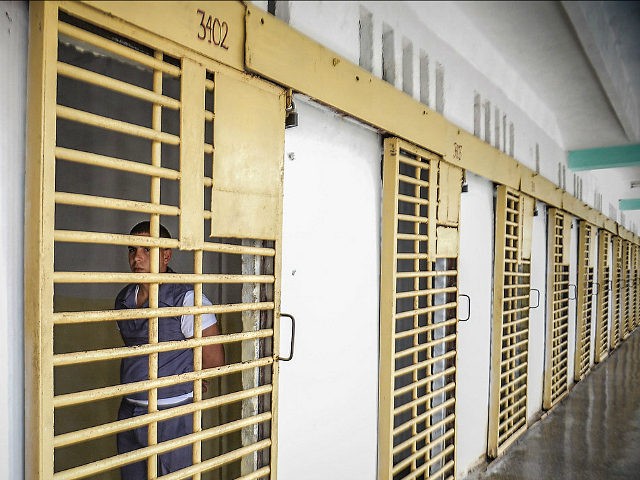WASHINGTON, DC — The totalitarian communist regime in Cuba continues to carry out human rights abuses and atrocities against the opposition, including “electroshock torture” on political prisoners for daring to speak out against the regime, revealed Luís Zúñiga, an anti-Castro dissident who spent 19 years behind bars.
“Brutal realities had and continue to be occurring in Cuba each and every day,” declared Cuban-American Rep. Ileana Ros-Lehtinen (R-FL), the chairwoman of a House foreign affairs panel.
“Abuse and repression that is still being committed in Castro’s Cuba,” she stressed.
Her comments came during a discussion at the U.S. Capitol Tuesday hosted by Justice Cuba.
During the event, Ernesto Diaz Rodriguez, an anti-communist advocate who spent 22 years as a regularly tortured political prisoner, during the event, accused “diabolic figures sick with power” within the Cuban regime of depriving anti-Castro people in Cuba of the “liberty without stains that is given to us by God.”
“Freedom in Cuba one day just fell through our fingers and was turned into prison and concentration camps,” he acknowledged.
Zúñiga highlighted the plight of Daniel Llorente, a fellow dissident who has been sent to Havana’s notorious mental institution Mazorra this year for running into the island nation’s communist May Day parade waving an American flag and allegedly yelling, “freedom for Cuba!”
Zúñiga described Llorente “a Cuban dissident” who was “beaten” before his arrest.
“He has been continuously subjected to electro shock” torture at the Mazorra facility, declared Zúñiga on Tuesday.
“Protesters are still being tortured with electro shocks now in 2017,” noted the dissident. “Trying to stop the torture Daniel Llorente engaged in a hunger strike. His family hasn’t heard from him in some time. We have no new information on the case.”
Zúñiga said there is a long list of political prisoners who find themselves in Llorente’s precarious predicament.
He added that the regime is also employing “sonic torture” to break prisoners physically and mentally by exposing them to “long periods electronic sounds that were drowning us out through huge speakers.”
The Cuban regime denies political prisoners all basic human rights, particularly medical service even when it is necessary to save their lives and contact with their relatives.
“For seven years, in a failed attempt to break our spirit, we were subjected to psychological and physical assaults. We were kept incommunicado without family contact and all type of medical assistance despite the health problems afflicting the prisoner,” said Zúñiga, adding:
These are only a glimpse of the atrocities suffered by political prisoners in Cuba. We hope our testimony will serve to highlight the systematic cruelty against those who are struggling towards a just system of government whose practices emanate from— transparent and fair elections capable of transitioning the country to a rebirth of a free nation that is democratic, and happy.
Since former U.S. President Barack Obama announced plans to restore full relations with Cuba in 2014, arbitrary arrests of Castro opponents have reached record levels.
Human Rights Watch reports that the independent Cuban Commission for Human Rights and National Reconciliation “received more than 7,900 reports of arbitrary detentions from January through August 2016. This represents the highest monthly average of detentions in the past six years.”
The previous year, the independent commission “received more than 6,200 reports of arbitrary detentions from January through October 2015.”
While the 2016 arrests amount to about 990 per month on average, the previous year, the monthly average reached 620.
Critics have blasted the Obama administration’s historic efforts to enhance relations with Cuba for not using it to demand much-needed action against the state-sponsored human rights abuses and other atrocities.
Obama officials pushed engagement that his administration believed would accelerate change in the island nation and promote economic opportunity in both countries.
Nevertheless, the brutal treatment of anti-Castro people is alive and well.
In October, Eliécer Llorente, the tortured prisoner’s son, told the Miami-based outlet Marti Noticias, “It is obvious State Security is keeping him there” as punishment for his repeated pro-U.S. transgressions and to prevent him from engaging in more protests.
The Castro regime has a long trapped and tortured pro-democracy dissidents in Mazorra.
The Castro regime has long used Mazorra as an alternative prison for political dissidents. In a 1995 report, Amnesty International noted that they had received reports that ‘political prisoners were being sent to psychiatric institutions’ detention pavilions controlled by the State, where they are confined in dangerous conditions with poor hygiene and exposed to ill-treatment from personnel and other inmates.
The Trump administration has said improvements to the United States-Cuba relationship is contingent upon the “Cuban government’s willingness to improve the lives of the Cuban people, including promoting the rule of law, respecting human rights, and taking concrete and specific steps to foster political and economic freedom.”

COMMENTS
Please let us know if you're having issues with commenting.